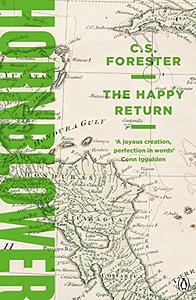Take a photo of a barcode or cover
adventurous
fast-paced
I read this book for a school assignment. It was very interesting and historically educational. However, I probably won't go on to read any more of the series. The story wasn't especially exciting, but that was mostly because the setting was usually just Hornblower and his crew sailing around. Overall, an educational and interesting read.
adventurous
challenging
emotional
funny
medium-paced
Plot or Character Driven:
Character
Strong character development:
Complicated
Loveable characters:
Yes
Diverse cast of characters:
No
Flaws of characters a main focus:
Yes
adventurous
funny
lighthearted
slow-paced
Plot or Character Driven:
A mix
Strong character development:
No
Loveable characters:
No
Diverse cast of characters:
No
Flaws of characters a main focus:
Yes
The original Hornblower is much grittier than the later prequels and delivers a more moving narrative.
The previous novels in chronological order seemed to be aimed at younger readers while this one seems more adult. There is quite a bit more violence which was a disappointment but it never becomes over the top or excessively detailed. I believe with this novel Forester attempted to show the reality and horrors of war at sea much more than he did in later books. He gives the reader a striking look into the exhaustive, tense, and brutal nature of life at sea.
Hornblower himself is more grim but it fits the tone and establishes one of literature’s great introspective heroes. His love interest Lady Barbara is also first introduced here and she is a great character in her own right. It’s easy to see why readers would’ve wanted more of them after reading this. Unfortunately the romance is adulterous but this is realistic for the period.
I found this book to have more touching character moments and memorable scenes than previous novels. I find this book to be both a satisfying adventure and a great glimpse into lives lived long ago. Plus without this book many other historical authors may never have put pen to paper and the Hornblower saga would not have inspired many great sci fi stories even including Star Trek.
The previous novels in chronological order seemed to be aimed at younger readers while this one seems more adult. There is quite a bit more violence which was a disappointment but it never becomes over the top or excessively detailed. I believe with this novel Forester attempted to show the reality and horrors of war at sea much more than he did in later books. He gives the reader a striking look into the exhaustive, tense, and brutal nature of life at sea.
Hornblower himself is more grim but it fits the tone and establishes one of literature’s great introspective heroes. His love interest Lady Barbara is also first introduced here and she is a great character in her own right. It’s easy to see why readers would’ve wanted more of them after reading this. Unfortunately the romance is adulterous but this is realistic for the period.
I found this book to have more touching character moments and memorable scenes than previous novels. I find this book to be both a satisfying adventure and a great glimpse into lives lived long ago. Plus without this book many other historical authors may never have put pen to paper and the Hornblower saga would not have inspired many great sci fi stories even including Star Trek.
adventurous
inspiring
mysterious
tense
fast-paced
Plot or Character Driven:
A mix
Strong character development:
Yes
Loveable characters:
Yes
Diverse cast of characters:
Yes
Flaws of characters a main focus:
Yes
This is the book that started it all. It’s pretty good, but as usual, Hornblower doesn’t know how to deal with women. Also Forester leans into the racist and colonial language. I’m sure it was “part of the time” but I still don’t like it. I’ve read books from that era that don’t use racial stereotypes. It can be done folks.
I do however like the villain of this story “El Supremo.” He’s a cartoon and a terrible person and thoroughly deserves his character arc. And he also sounds like a really bad cigar.
I do however like the villain of this story “El Supremo.” He’s a cartoon and a terrible person and thoroughly deserves his character arc. And he also sounds like a really bad cigar.
Fun book- the last book by jumping in to the future helped to further the tension between Barbara and Hornblower but it also killed the suspense. The book was still fun to read though- and I can't wait to read the next one!
Runs along at pace, although the last quarter is more romance than naval adventure.



